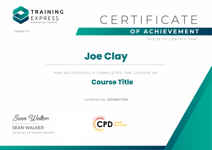Food Microbiology and Quality Control
CPD Accredited | Free PDF & Hardcopy Certificate included | Free Retake Exam | Lifetime Access
Training Express Ltd
Summary
- Digital certificate - Free
- Hard copy certificate - Free
- Exam(s) / assessment(s) is included in price
- Tutor is available to students
Add to basket or enquire
Overview
Ever wonder how food gets to your table? How does it stay fresh and safe to eat? The answer lies in food microbiology.
Food microbiology is the study of microorganisms that affect food. In this course, you will learn about the basics of food microbiology, including the different types of microorganisms that can be found in food, how they affect food, and how to control them. You will also learn about the different methods of food preservation and the different types of foodborne diseases.
Learning Outcomes:
- Understand the fundamental principles of food microbiology and its importance in the food industry.
- Gain a solid understanding of food microbiology's fundamental principles and its significance in the food industry.
- Identify and analyse characteristics and behaviours of food microbiology.
- Explore methodologies for preserving food using microorganisms.
- Acquire insights into food microbiology and microorganisms' role in food fermentation processes.
- Recognise signs of food spoilage caused by microorganisms.
CPD
Course media
Description
Module 01: Explore the significance of studying food microbiology in food safety and quality control. Gain a foundational understanding of different types of microorganisms and their role in the food industry.
Module 02: Dive into the world of bacteria, fungi, viruses, and other microorganisms commonly found in food. Understand their characteristics, growth conditions, and potential impact on food contamination and spoilage in food microbiology.
Module 03: Discover how microorganisms can be utilised to preserve food and extend its shelf life. Explore fermentation, curing, and pickling techniques and their impact on food quality and safety.
Module 04: Uncover the fascinating world of food fermentation and its role in creating a wide range of food products in food microbiology. Learn about different types of fermentations and the microorganisms involved in the transformation process.
Module 05: Identify signs of food spoilage caused by microorganisms and understand the factors influencing their growth. Explore preventive strategies and control measures to maintain product quality and safety.
Module 06: Learn about common pathogens responsible for foodborne illnesses and their impact on public health. Discover the routes of contamination and the importance of proper food handling to prevent foodborne diseases.
Module 07: Gain insights into the roles and responsibilities of food microbiologists and their roles in food microbiology. Explore the skills and knowledge required for a career in the field and their contributions to ensuring food safety and quality control.
Certification
Upon successful completion of the course, all learners will be eligible to receive a certificate titled Food Microbiology to acknowledge their achievement. We are delighted to offer two formats for your certificate: PDF and Hardcopy.
- PDF Certificate: This digital version of your certificate will be available for you to download and print for totally FREE.
- Hardcopy Certificate: For those who wish to have a physical token of their achievement, we offer a high-quality, printed certificate. This hardcopy certificate is also provided free of charge. However, please note that delivery fees apply.
- UK Delivery: If your shipping address is within the United Kingdom, the delivery fee will be only £3.99.
- International Delivery: For all international addresses outside of the United Kingdom, the delivery fee will be only £10.
Who is this course for?
- Food industry professionals interested in enhancing their theoretical knowledge of food microbiology.
- Quality control personnel responsible for ensuring the safety and quality of food products.
- Students and researchers seeking a comprehensive theoretical foundation in food microbiology.
- Individuals passionate about food safety and microbiological control in the food industry.
Career path
- Food Microbiologist: £25,000 - £45,000 per year
- Quality Assurance Specialist: £30,000 - £50,000 per year
- Research Scientist: £35,000 - £60,000 per year
- Food Safety Auditor: £28,000 - £45,000 per year
- Regulatory Compliance Officer: £30,000 - £50,000 per year
Questions and answers
Currently there are no Q&As for this course. Be the first to ask a question.
Certificates
Digital certificate
Digital certificate - Included
Hard copy certificate
Hard copy certificate - Included
Hardcopy Certificate (UK Delivery):
For those who wish to have a physical token of their achievement, we offer a high-quality, printed certificate. This hardcopy certificate is also provided free of charge. However, please note that delivery fees apply. If your shipping address is within the United Kingdom, the delivery fee will be only £3.99.
Hardcopy Certificate (International Delivery):
For all international addresses outside of the United Kingdom, the delivery fee for a hardcopy certificate will be only £10.
Reviews
Currently there are no reviews for this course. Be the first to leave a review.
Legal information
This course is advertised on reed.co.uk by the Course Provider, whose terms and conditions apply. Purchases are made directly from the Course Provider, and as such, content and materials are supplied by the Course Provider directly. Reed is acting as agent and not reseller in relation to this course. Reed's only responsibility is to facilitate your payment for the course. It is your responsibility to review and agree to the Course Provider's terms and conditions and satisfy yourself as to the suitability of the course you intend to purchase. Reed will not have any responsibility for the content of the course and/or associated materials.



